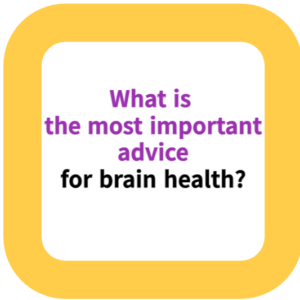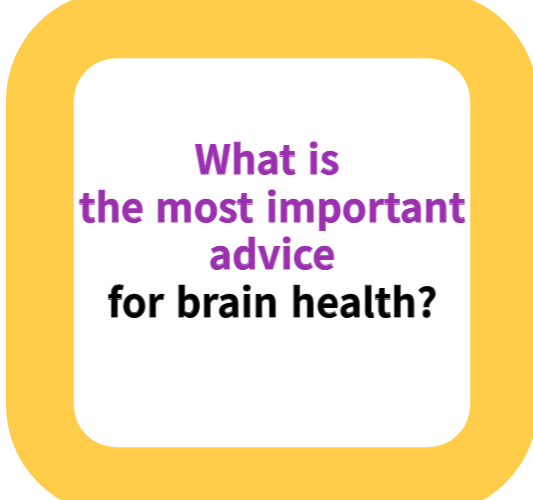What is the most important advice for brain health?
Welcome to our blog, where we delve into the fascinating world of brain health and the profound impact our daily habits have on our cognitive function and overall well-being.
In today’s fast-paced world, it’s easy to fall into routines that may not serve our mental health best. From the significance of a good night’s sleep to the hidden dangers of sugar overload, smoking, and pollution, our blog explores a variety of topics that affect brain health.
We offer practical advice on how to avoid common pitfalls and embrace healthier lifestyle choices. Whether you’re interested in improving your memory, boosting your cognitive abilities, or simply looking for ways to protect your brain as you age, our blog provides valuable insights and tips to help you on your journey toward optimal brain health.
Join us as we uncover the secrets to maintaining a sharp and vibrant mind through conscious living and holistic wellness practices.
What is the most important advice for brain health?

Introduction: Understanding the Pillars of Brain Health
The brain, a complex and vital organ, requires careful attention to maintain its health and functionality. As we age, our lifestyle choices become increasingly pivotal in either supporting or hindering our cognitive abilities and overall brain health.
Negative habits can accelerate cognitive decline, diminish mental capabilities, and increase the susceptibility to neurological disorders.This comprehensive guide delves into various unhealthy habits detrimental to brain health, offering insights and recommendations for fostering a healthier, more vibrant brain.
1. The Critical Role of Sufficient Sleep
Sleep is not merely a passive state but a critical period during which the brain detoxifies, repairs, and strengthens itself. Chronic sleep deprivation or poor sleep quality can lead to significant cognitive impairments, including memory loss, decreased problem-solving abilities, and reduced alertness.
Moreover, it exacerbates the risk of developing neurodegenerative diseases such as Alzheimer’s. Creating a conducive sleep environment free from noise and light pollution, and establishing a regular sleep schedule, are foundational steps toward enhancing sleep quality and, by extension, brain health.
2. Breakfast: The Foundation of Daily Cognitive Performance
Often overlooked, breakfast plays a significant role in kick-starting the brain’s energy levels for the day. Skipping this essential meal can result in a decrease in blood glucose levels, crucial for brain function, leading to cognitive slumps and long-term neuronal damage. Incorporating a nutrient-rich breakfast can stabilize blood sugar and supply the brain with the necessary fuel to operate efficiently.
3. Sugar Overload: A Sweet Risk to Brain Health
High sugar consumption is a modern dietary pitfall, contributing to a plethora of health issues, including cognitive decline. Excessive sugar intake disrupts insulin regulation, which is integral to brain function, and can impair cognitive processes such as memory and learning.
It is crucial to moderate sugar consumption and opt for natural sugars found in fruits and whole foods to maintain optimal brain function.

4. Smoking: A Cloud of Harm
Smoking’s immediate relaxation effects mask its long-term detrimental impacts on brain health. Nicotine and other harmful compounds in cigarettes reduce oxygen flow to the brain and introduce toxins that can lead to neuronal damage, cognitive decline, and an increased risk of stroke and Alzheimer’s disease. Quitting smoking is among the most beneficial actions one can take to protect and improve brain health.
5. Stress Management, Keeping Calm for Cognitive Clarity
Chronic stress wreaks havoc on the brain, leading to inflammation and damage to brain cells. This can manifest as memory problems, decreased productivity, and heightened risk of mental health disorders.
Developing effective stress management techniques, such as mindfulness, meditation, and physical exercise, can mitigate these effects and promote a healthier, more resilient brain.
6. Mitigating Pollution Exposure: A Breath of Fresh Air
Urban living exposes individuals to high levels of air pollution, which can negatively affect cognitive function by reducing the brain’s oxygen supply.
While completely avoiding pollution might be unrealistic for many, taking steps such as using air purifiers at home and seeking greener spaces can help minimize exposure and its adverse effects on brain health.
7. The Importance of Social Interaction and Verbal Communication
Human beings are inherently social creatures, and our brains thrive on interaction and communication. Engaging in regular, meaningful conversations can enhance cognitive functions such as memory, attention, and emotional regulation.
Making an effort to connect with others, whether through social activities, family gatherings, or even digital means, can provide significant mental stimulation and emotional support.
8. Sleeping Habits: Uncovering the Brain
The habit of sleeping with the head covered can lead to increased carbon dioxide and decreased oxygen levels around the brain, potentially causing long-term damage. Ensuring a well-ventilated sleeping environment can prevent these risks and promote better sleep quality and brain health.
9. Lifelong Learning: A Stimulus for Brain Health
The brain possesses a remarkable ability to adapt and grow, a phenomenon known as neuroplasticity. Engaging in new learning experiences, challenging oneself with puzzles and games, and pursuing hobbies can stimulate the brain, enhance cognitive reserve, and protect against cognitive decline. Lifelong learning is a key component of a brain-healthy lifestyle.
10. The Dangers of Overworking During Illness
Pushing the brain to work hard during periods of illness, such as flu or other infections, can impede the healing process and strain cognitive functions. Prioritizing rest, hydration, and light, brain-resting activities during illness can support recovery and prevent further cognitive strain.
Conclusion: A Holistic Approach to Brain Health
Maintaining brain health extends beyond avoiding negative habits; it encompasses embracing a holistic lifestyle that nurtures both mental and physical well-being. This includes a balanced diet, regular physical activity, sufficient rest, mental stimulation, and strong social connections.
By recognizing and modifying detrimental habits, individuals can significantly enhance their brain health, cognitive function, and quality of life, laying the foundation for a mentally vibrant future.
